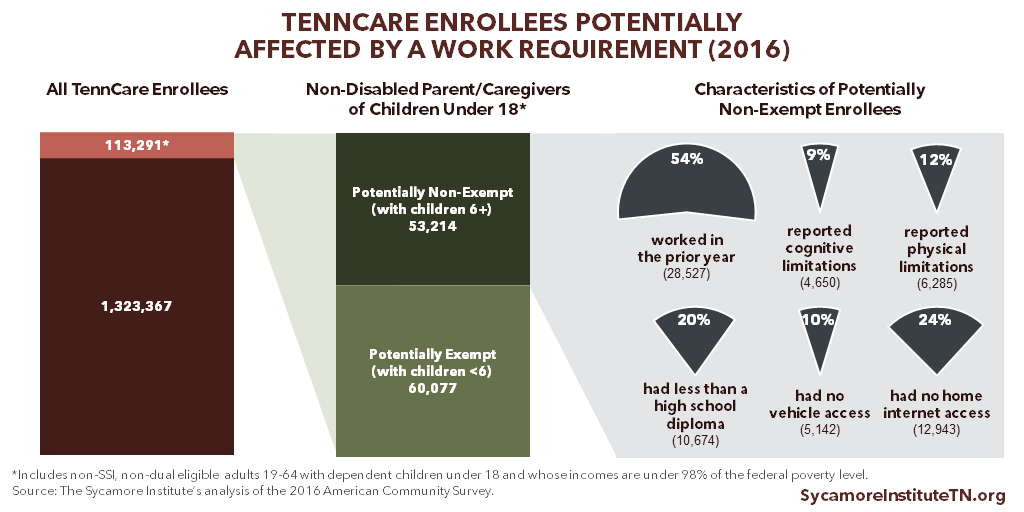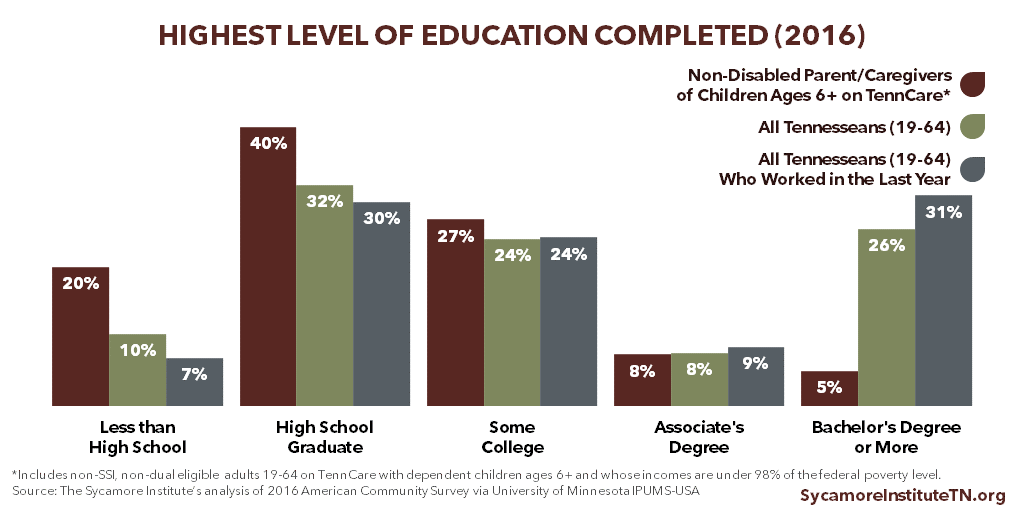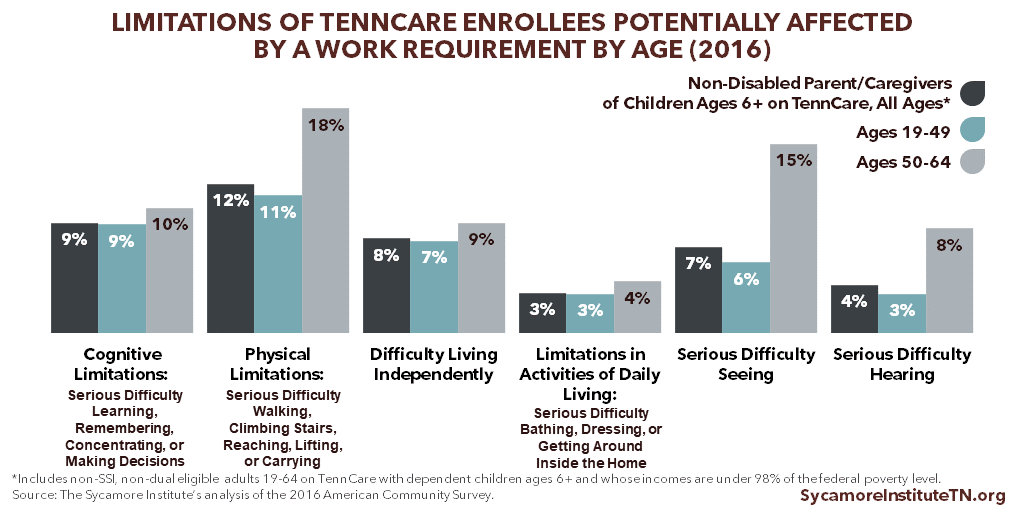
Key Takeaways
- Most TennCare enrollees subject to the forthcoming work requirement would likely be among 53,000 parents and caretakers of children age 6 and older. That figure (probably an overestimate) accounts for less than 4% of all enrollees.
- 54% of the TennCare enrollees in this group reported having worked in the past year.
- This group has lower-than-average educational attainment, which can be an obstacle to work and self-sufficiency.
- Many in this group are in poor health, lack home internet access, and/or do not have access to a personal vehicle. These obstacles could also hinder their ability to get a job, keep it, and/or meet reporting requirements.
A new Tennessee law directs TennCare, the state’s Medicaid program, to seek federal approval to require certain enrollees to work or engage in activities like school, caregiving, or volunteering. Judging by programs approved in 4 other states, TennCare will have flexibility to negotiate the details within the bounds of state law and federal guidance. Those details include: who is affected, what counts as work, what supports affected enrollees receive, and how to monitor compliance.
This brief examines obstacles to employment for the TennCare enrollees most likely to be subject to a work requirement. Understanding this population may help TennCare avoid unintended consequences as it considers specific exemptions, support services, and compliance and monitoring. Research shows a TennCare work requirement may help encourage progress towards self-sufficiency, but potential unintended consequences include the loss of health coverage for some low-income Tennesseans.
TennCare Work Requirement Most Likely to Affect Parents & Caretakers of Kids 6+
Based on currently available information, most TennCare enrollees subject to a work requirement would likely be non-disabled parents or caretaker relatives of children age 6 and older. We based this conclusion on a combination of federal guidance, state law, legislative history, and our understanding of TennCare’s preliminary work on drafting a proposal.
Federal guidance limits Medicaid work requirements to “non-elderly, non-pregnant adult beneficiaries who are eligible for Medicaid on a basis other than disability.” (1) Tennessee law further limits the scope to “able-bodied working age adult enrollees without dependent children under the age of 6.” (2) Using information provided by TennCare, the fiscal note for that law assumed the requirement would only apply to 1 TennCare eligibility category — adult parents and caretaker relatives of dependent children. (3) Childless adults without disabilities are largely ineligible for TennCare.
Reminder: The scope of the final work requirement could be broader or narrower than we assume in this brief. While evidence from 4 other states suggests the constraints mentioned above will hold true in Tennessee, neither the federal guidance nor the fiscal note have the force of law.
Other interpretations of the federal guidance also exist. Some interpret the guidance to say that anyone enrolled in and exempt from work requirements for the Supplemental Nutrition Assistance Program (SNAP) must also be exempt from a TennCare work requirement. That would include every adult enrolled in both TennCare and SNAP with a dependent child in the house, making very few individuals subject to TennCare’s work requirement.
Figure 1
4 Key Facts about These Parents & Caretakers
Our analysis of data and research on this subset of enrollees revealed 4 key facts relevant to the discussion about TennCare work requirements. To see the details of our analysis, see the Summary of Methods & Limitations below and the separate Appendix.
1. This group represents about 4% of TennCare enrollees.
Non-disabled parents and caretakers of children ages 6 and older accounted for an estimated 53,000 TennCare enrollees in 2016. That amounts to 3.7% of all TennCare enrollment that year. (Figure 1) (4) This number likely overestimates the total number of people who would be subject to the work requirement.
Due to limitations in the data, we are unable to exclude some individuals who may already meet work requirements in other programs or who are eligible for TennCare through a different category (see Summary of Methods & Limitations for more details).
2. A little more than half of them reported having worked in the prior year.
About 29,000 of the enrollees in this group (54%) reported that they had worked in the prior year (Figure 1). ). Of those who reported working, about 9,100 (32%) worked 20 hours or more per week. Among those who reported not working, about 4,400 (18%) were looking for work.
Figure 2
3. Lower levels of educational attainment within this group could be an obstacle to work and self-sufficiency.
About 11,000 of these TennCare enrollees (20%) do not have a high school diploma, while about 7,000 (13%) have completed an associate’s degree or more — compared to 7% and 39%, respectively, among all working Tennesseans ages 19-64 (Figure 2). (4)
Individuals with higher levels of education are more likely to have jobs, earn higher wages, and have better health outcomes. (5) In addition, a growing number of jobs require some level of postsecondary education. By 2020, an estimated 58% of jobs in Tennessee will require some postsecondary education. (6)
4. Poor health status and lack of internet access or a personal vehicle may hinder the ability of many to get and keep a job.
Over 6,000 people in this group (12%) report serious physical health limitations, and nearly 5,000 (9%) report serious cognitive limitations (Figure 3). (4) Mental and physical health problems can limit a person’s ability to work as well as the type of jobs available to them. (7) In many cases, these individuals’ ability to work varies over time.
Physical limitations are even more common among the nearly 7,000 people in this group (13%) between the ages of 50-64 (Figure 3). Among the 4 current states with federal approval for a Medicaid work requirement, Indiana and Arkansas plan to exempt individuals over the age of 60 and 50, respectively. (8) (9)
Figure 3
Nearly 13,000 enrollees in this group (24%) do not have any internet access at home (Figure 1). (4) Lack of internet access could affect enrollees’ ability to find and apply for jobs and send compliance information to TennCare.
Research shows not having broadband internet access at home is associated with greater difficulty contacting potential employers, completing online job applications, and creating a resume. Individuals with broadband internet access also have shorter bouts of unemployment and higher overall employment rates. (10) For example, Arkansas’ approved work requirement will require enrollees to go online to confirm exemptions and requirements. (11)
Over 5,000 people in this group (10%) do not have access to a personal vehicle (Figure 1). (4) Lack of transportation is a significant obstacle to work. An evaluation of Tennessee’s Families First work requirement found that participants with access to a car were more likely to be employed, find higher paying jobs, maintain employment, and leave the program. (12)
Parting Words
Other states’ Medicaid work requirements vary in significant ways — including who must fulfill them, who is exempt, what counts as work, and how enrollees will confirm exemptions and/or compliance. TennCare has the flexibility to negotiate these details within the boundaries set by state law and federal guidance.
Federal guidance also calls on states to outline their strategies for helping enrollees meet a Medicaid work requirement (e.g. linking individuals to support services, such as transportation, childcare, and job placement). Understanding who would most likely be subject to a TennCare work requirement and what obstacles to employment they face may help TennCare weigh the trade-offs of each decision and avoid unintended consequences.
Related Work by The Sycamore Institute
Medicaid Work Requirements in TN (1 of 3): What, Why, and Who?
(September 14, 2017) Explains what Medicaid work requirements are, why there is interest, and who in Tennessee they could likely affect.
Medicaid Work Requirements in TN (2 of 3): Lessons from TN’s Welfare-to-Work Experience
(December 6, 2017) Explores insights in the work requirement for Families First — another state-run, federally-sanctioned program.
Medicaid Work Requirements in TN (3 of 3): Key Considerations for Policymakers
(December 8, 2017) Lays out the key points to consider in the debate over whether to add a work requirement to TennCare — from goals and details to support services and potential unintended consequences.
Digesting the Feds’ New Guidance & 1st Approval of Medicaid Work Requirements
(January 22, 2018) provides an overview and analysis of the federal government’s new guidance on Medicaid work requirements and the approval of Kentucky’s plan.
6 Insights for the Debate over TennCare Work Requirements
(February 19, 2018) provides key points to Tennessee policymakers to consider as they work on legislation directing TennCare to submit a waiver to impose work requirements.
Who is Exempt from Proposed TennCare Work Requirements?
(March 28, 2018) Summarizes exemptions to Medicaid work requirements in Tennessee and other states.
Summary of Methods & Limitations
We analyzed publicly available data from 2016 to better understand the demographics, employment history, health limitations, and potential obstacles to employment and compliance for individuals most likely to be subject to a TennCare work requirement. We used survey data because TennCare enrollee data are not publicly available.
Our methods reflect previous studies in this area. (13) (14) Our analysis consisted of the following steps (see Appendix):
- Limited the study population to most closely reflect TennCare’s parent/caretaker relative eligibility category. Based on information provided by TennCare during the legislative process, a work requirement is likely to be targeted to this eligibility category. Among Tennesseans who reported receiving TennCare, our analysis:
- Includes only adults ages 19-64 who are parents or caretakers of dependent children under the age of 18 and whose incomes are under 98% of poverty, and
- Excluded individuals in this group who may qualify for TennCare because they have a disability — including any individuals who reported receiving Supplemental Security Income (SSI) or who are dually enrolled in Medicare and TennCare.
- Divided the study population into 2 groups: potentially exempt parents/caretakers (with dependents under 6) and potentially non-exempt parents/caretakers (with dependents over the age of 6). Our analysis primarily focused on the potentially non-exempt parents/caretakers.
- Examined available demographics, employment history, health limitations, and obstacles to employment/compliance for each group.
The primary limitation of our approach is that our study population is likely overestimated. Due to limitations in the data, we are unable to exclude some individuals who may already be meeting work requirements in other programs (e.g. TANF or SNAP). We are also unable to exclude some individuals who are eligible for TennCare through a category other than the parent/caretaker relative category. For example, some individuals in the following eligibility categories may be included in our study population if they also fit the criteria outlined above:
- Pregnant women
- Individuals in need of care traditionally provided in nursing homes
- Uninsured women who have had breast or cervical cancer detected by the Tennessee Breast and Cervical Cancer Screening Program
- Individuals up to age 26 who age out of the foster care system
See the Appendix for more information about the data, methods, limitations, and findings of our analysis.
References
Click to Open/Close
- U.S. Department of Health and Human Services. RE: Opportunities to Promote Work and Community Engagement Among Medicaid Beneficiaries. Centers for Medicare and Medicaid Services. [Online] January 11, 2018. [Cited: January 12, 2018.] https://www.medicaid.gov/federal-policy-guidance/downloads/smd18002.pdf.
- State of Tennessee. Public Chapter No. 869. [Online] 2018. [Cited: June 29, 2018.] https://publications.tnsosfiles.com/acts/110/pub/pc0869.pdf.
- Tennessee General Assemble Fiscal Review Committee. Fiscal Note HB 1551 – SB 1728. [Online] February 12, 2018. [Cited: February 13, 2018.] http://www.capitol.tn.gov/Bills/110/Fiscal/HB1551.pdf.
- Ruggles, Steven, et al. Integrated Public Use Microdata Series: Version 7.0 [dataset]. University of Minnesota. [Online] 2017. https://doi.org/10.18128/D010.V7.0.
- Watson, Audrey L. Employment trends by typical entry-level education requirement. Bureau of Labor Statistics. [Online] September 2017. https://www.bls.gov/opub/mlr/2017/article/pdf/employment-trends-by-typical-entry-level-education-requirement.pdf.
- Carnevale, Anthony P, Smith, Nicole and Strohl, Jeff. Recovery: Job Growth and Education Requirements Through 2020 State Report. Georgetown Public Policy Institute, Center on Education and Workforce, Georgetown University. [Online] June 2013. https://1gyhoq479ufd3yna29x7ubjn-wpengine.netdna-ssl.com/wp-content/uploads/StateProjections_6.1.15_agc_v2.pdf.
- Garfield, Rachel, et al. Implications for Work Requirments in Medicaid: What Does the Data Say? Kaiser Family Foundation. [Online] June 12, 2018. http://files.kff.org/attachment/Issue-Brief-Implications-of-Work-Requirements-in-Medicaid-What-Does-the-Data-Say.
- Department of Health and Human Services. Approval Package for Indiana’s Section 1115 Demonstration Project. Center for Medicare and Medicaid Services. [Online] February 1, 2018. [Cited: March 22, 2018.] https://www.in.gov/fssa/hip/files/IN-HIP-1115-Approval-Package_2-1-2018.pdf.
- —. Approval Package for Arkansas’ Section 1115 Demonstration Projects. Centers for Medicare & Medicaid Services. [Online] March 5, 2018. [Cited: March 22, 2018.] https://www.medicaid.gov/Medicaid-CHIP-Program-Information/By-Topics/Waivers/1115/downloads/ar/ar-works-ca.pdf.
- Whitehouse Council of Econmic Advisers. The digital divide and economic benefits of broadband access. [Online] March 2016. https://obamawhitehouse.archives.gov/sites/default/files/page/files/20160308_broadband_cea_issue_brief.pdf.
- Garfield, Rachel, et al. Implications of Work Requirements in Medicaid: What Does the Data Say? Kaiser Family Foundation. [Online] June 12, 2018. https://www.kff.org/medicaid/issue-brief/implications-of-work-requirements-in-medicaid-what-does-the-data-say.
- Richards, Tami and Bruce, Donald. Car Access and Employment Outcomes for Tennessee Welfare Recipients: A Report to the Tennessee Department of Human Services. Center for Business and Economic Research, College of Business Administration, The University of Tennessee Knoxville. [Online] June 2004. http://cber.haslam.utk.edu/TDHS/ffjun0400.pdf.
- Li, Linda, Kemper, Leah and McBride, Timothy. The Demographics of Missouri Medicaid: Implications for Work Requirements. Center for Health Economics and Policy, Institute for Public Health at Washington University. [Online] March 2018. [Cited: August 13, 2018.] https://publichealth.wustl.edu/wp-content/uploads/2018/06/MO-Medicaid-Demographics-and-Work-Requirement_2.pdf.
- Gangopadhyaya, Anuj and Kenney, Genevieve M. Updated: Who Could Be Affected by Kentucky’s Medicaid Work Requirements, and What Do We Know about Them? Urban Institute. [Online] March 2018. https://www.urban.org/sites/default/files/publication/96576/3.26-ky-updates_finalized_1.pdf.
- Melton, Courtnee. How Socioeconomic Factors Affect Health in Tennessee. The Sycamore Institute. [Online] June 2018. https://www.sycamoreinstitutetn.org/how-socioeconomic-factors-affect-health/.
- Melton, Courtnee and Pellegrin, Mandy. Medicaid Work Requirements in Tennessee Part 2 of 3: Lesson’s from Tennessee’s Welfare-to-Work Experience. The Sycamore Institute. [Online] December 6, 2017. https://www.sycamoreinstitutetn.org/medicaid-work-reqs-welfare-to-work/.


















